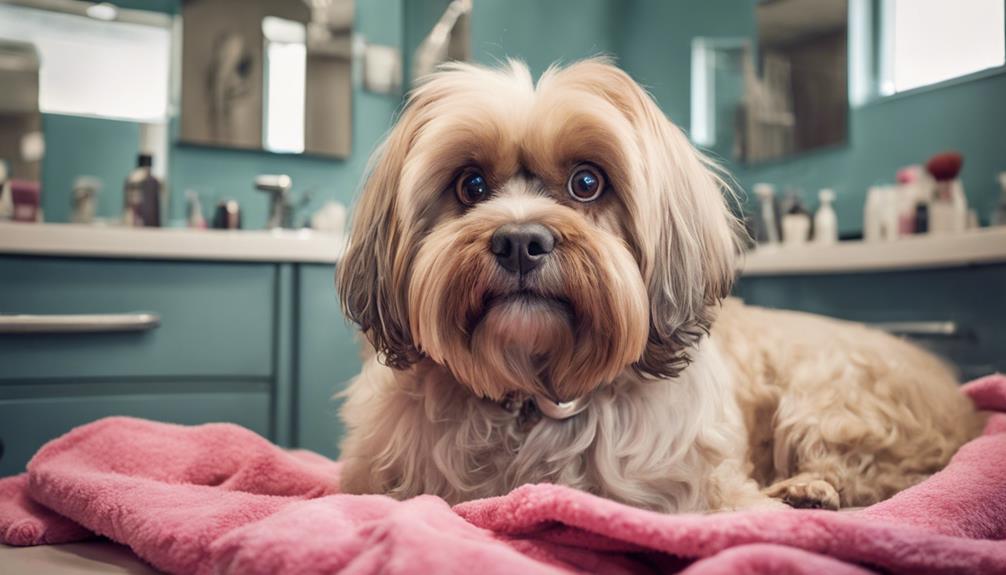When dogs take antibiotics, some medications can make them pee more. This happens because the medicine can make them feel thirstier. So, they drink more water and end up peeing frequently. You might notice changes in how often they go to the bathroom and the amount of pee they produce. Monitoring their water intake and bathroom habits helps understand these effects. If you see unusual patterns, like increased peeing, tell your vet. Remember, changes in urination habits on antibiotics are common. It's important to track these changes carefully for your dog's health and well-being.
Key Takeaways
- Antibiotics can increase a dog's thirst, leading to more frequent urination.
- Some antibiotics may change the color of a dog's urine.
- Monitoring water intake and urination patterns is crucial.
- Changes in urination frequency and volume should be expected.
- Consult a vet for guidance on antibiotic-related urination changes.
Antibiotics and Increased Urination in Dogs
Have antibiotics ever made your dog pee more frequently than usual?
Antibiotics, such as metronidazole and amoxicillin, can indeed lead to increased thirst and subsequent increased urination in dogs. When administering antibiotics to your furry friend, it's essential to monitor their water intake closely. Changes in urination patterns, like increased frequency or volume, should be noted.
These side effects, including increased urination, need to be reported to your vet for evaluation. Understanding how antibiotics can affect your dog's urination is vital for managing any related issues. By staying vigilant and observant, you can address concerns promptly and safeguard your pet's well-being.
Understanding Antibiotic Effects on Dog Urination

Antibiotics can impact dog urination by causing increased thirst and subsequent frequent urination. When your furry friend is on antibiotics, it is crucial to keep an eye out for signs of increased thirst and urination. Monitoring their water intake and urination patterns is key to understanding how the antibiotics are affecting them. Some antibiotics, such as Triamcinolone, may act like steroids and lead to even more frequent urination. Remember, these side effects are usually temporary and should resolve once the medication is completed.
To help you keep track of these changes, here's a table to assist in monitoring your dog's urination habits while they are on antibiotics:
| Signs to Watch For | What to Do |
|---|---|
| Increased Thirst | Ensure fresh water is always available. |
| Increased Urination | Take note of frequency and any changes in color or odor. |
| Monitoring Water Intake | Measure how much water your dog is drinking daily. |
| Observing Behavior | Look out for any other unusual symptoms and consult your vet if concerned. |
Factors Influencing Dog Urination on Antibiotics

Understanding the various factors that can influence a dog's urination while they're on antibiotics is essential for pet owners to monitor their furry friend's health effectively. Antibiotics, such as metronidazole and amoxicillin, can lead to increased thirst in dogs, resulting in more frequent urination. These medications may cause changes in your dog's urination patterns due to their side effects.
It's vital to pay attention to how often your dog is drinking water and urinating while on antibiotics. Monitoring these aspects can help you detect any abnormal behavior or potential issues early on. If you notice significant changes in your dog's urination habits, such as excessive urination or difficulty urinating, it's important to consult your vet promptly.
Monitoring Dog Urination on Medication
When monitoring your dog's urination on medication, it's important to pay attention to the frequency of their bathroom breaks. Changes in the volume of urine produced can also indicate how their body is reacting to the antibiotics.
Observing behavior patterns around urination, such as any signs of discomfort or urgency, can provide valuable insights into their overall health while on medication.
Frequency of Urination
Monitoring our furry companions' urination frequency while they're on antibiotics is essential to detect any potential changes. Antibiotics can cause increased thirst in dogs, leading to more frequent urination. It's important to keep an eye on how often your dog is peeing while on medication.
Some antibiotics, such as Amoxicillin, may make your dog drink more water, resulting in increased urination. While increased urination can be a common side effect of antibiotics, it usually resolves once the treatment is completed.
If you notice significant changes in your dog's urination patterns or if you have any concerns, it's best to consult your veterinarian for guidance. Paying attention to your dog's bathroom habits can help safeguard their health and well-being during antibiotic treatment.
Changes in Volume
During antibiotic treatment, noticing changes in the volume of your dog's urine is essential for monitoring their response to the medication. Antibiotics can increase your dog's thirst, leading to higher water intake and, consequently, larger amounts of urine being produced. To track the effects of antibiotics on your dog's urination habits, monitoring changes in urine volume is vital. Your dog may pee more frequently but in smaller amounts due to increased water consumption caused by the medication. By observing any unusual patterns in your dog's urination volume, you can gain insight into how antibiotics are affecting their urinary habits. The table below summarizes key points to keep in mind when monitoring your dog's urination while on antibiotics.
| Aspect | Consideration | Importance |
|---|---|---|
| Urination Volume | Increase or decrease | Indicates medication response |
| Water Intake | Monitoring thirst levels | Reflects antibiotic impact |
| Frequency | Tracking urination frequency | Shows changes in habits |
| Observation | Noting any unusual patterns | Helps evaluate medication effects |
Monitoring Behavior Patterns
We can observe changes in our dog's behavior patterns, such as increased water intake and frequent urination, while they're on antibiotics to monitor their response to the medication.
- Keep Track: Note down the frequency and volume of your dog's urination to spot any unusual patterns.
- Watch for Excessive Drinking: Increased thirst can lead to more urination, so monitor water consumption as well.
- Look for Signs of Discomfort: If your dog seems to be straining or experiencing pain while urinating, consult your vet.
- Consult the Vet: If you notice significant changes in your dog's urination habits while on antibiotics, seeking professional advice is essential.
Antibiotics and Dog Urinary Behavior

When dogs are on antibiotics, they may experience changes in how often they pee and the color of their urine. Some antibiotics can cause dogs to urinate more frequently and may even lead to darker or lighter urine than usual.
It's important to monitor your dog's urinary habits closely while they're on medication to guarantee they stay healthy and comfortable.
Urinary Frequency on Antibiotics
Antibiotics may cause dogs to experience increased urinary frequency due to the medication's impact on their urinary behavior. When dogs are on antibiotics, changes in urination frequency and volume can occur.
To manage this, monitoring water intake is important as antibiotics can lead to increased thirst and subsequently more urination. It's vital to keep an eye on any excessive urination while your dog is on antibiotics. Remember, these changes should be temporary and resolve once the medication course is completed.
Here's what you need to know:
- Antibiotics can lead to increased thirst and subsequently more urination in dogs.
- Certain antibiotics, like amoxicillin, can affect dogs' urinary behavior.
- Dogs on antibiotics may exhibit changes in urination frequency and volume.
- Monitoring water intake is significant when dogs are on antibiotics to manage increased urination.
Impact on Urine Color
Changes in a dog's urine color can be influenced by the presence of antibiotics in their system. Antibiotics can alter urine color, making it appear darker or cloudier than usual. Additionally, some antibiotics may lead to increased urination frequency in dogs, affecting their urinary behavior.
Changes in urine odor may also occur due to the antibiotics present in the dog's system. It's essential to monitor your dog's urine output and color while they're on antibiotics to track the impact on their urinary habits.
If you notice any significant changes in their urine color, odor, or frequency of urination, it's advisable to consult your veterinarian for further guidance on managing your dog's urinary health during antibiotic treatment.
Addressing Excessive Dog Urination on Antibiotics

Could the increased urination in dogs on antibiotics be a cause for concern? When handling excessive dog urination while on antibiotics, it's important to keep a close eye on your furry friend's behavior and habits. Here are some key points to take into account:
- Antibiotics and Increased Thirst: Certain antibiotics can lead to increased thirst in dogs, which may contribute to more frequent urination.
- Monitoring Water Intake: It's vital to monitor your dog's water intake while they're on antibiotics to make sure they stay properly hydrated.
- Side Effect Possibility: Increased urination from antibiotics might be a temporary side effect that should subside once the medication course is completed.
- Consulting a Vet: If your dog continues to excessively pee even after finishing the antibiotics, consulting a vet is recommended to rule out any underlying issues.
Tips for Managing Dog Urination Changes

One effective way to manage shifts in your dog's urination patterns is by closely monitoring their water intake. Keeping an eye on how much water your dog is drinking and how often they are urinating can help you identify any significant changes. Here are some tips for managing your dog's urination changes:
| Tip | Description | Benefits |
|---|---|---|
| Monitor Water Intake | Keep track of how much water your dog is drinking daily. | Helps detect any excessive drinking habits. |
| Track Urination Frequency | Note down how often your dog is urinating throughout the day. | Aids in identifying any unusual patterns. |
| Establish Routine Walks | Stick to a consistent schedule for bathroom breaks during the day. | Promotes regular and healthy elimination. |
| Provide Regular Potty Breaks | Make certain your dog has frequent opportunities to relieve themselves. | Reduces the likelihood of accidents indoors. |
| Encourage Outdoor Play | Engage your dog in active playtime to encourage urination outside. | Helps in avoiding accidents in the house. |
Consulting a Vet About Dog Urination Issues

When addressing dog urination issues, seeking guidance from a veterinarian is vital to pinpoint potential causes and solutions. It's essential to consult a vet if you notice increased urination in your dog, especially after taking antibiotics. Here are some reasons why consulting a vet is important:
- Vets can determine if the antibiotics are causing excessive peeing or if there's an underlying issue.
- Monitoring your dog's urination patterns and discussing any concerns with a vet is important.
- Vets can provide guidance on managing antibiotic side effects that affect urination.
- Regular communication with a vet can help address and resolve dog urination issues effectively.
Antibiotics and Dog Urination: Expert Insights

Exploring the impact of antibiotics on dog urination reveals important insights into their effects on canine physiology. Antibiotics, such as metronidazole and amoxicillin, can lead to increased thirst and urination in dogs. These medications work by targeting bacteria in the body, but they can also affect the dog's overall system, leading to changes in urination patterns.
It's vital to monitor your dog's water intake and urination frequency while they're on antibiotics to make sure they aren't experiencing any adverse side effects. While increased urination may be a side effect of antibiotics, it should be temporary and typically resolves once the medication course is completed.
If you notice that your dog is urinating excessively or if you have any concerns about the effects of antibiotics on their urination habits, it's essential to consult a veterinarian. Veterinarians can provide expert insights, guidance, and support to guarantee your dog's health and well-being are maintained throughout the antibiotic treatment.
Frequently Asked Questions
Can Medication Cause Frequent Urination in Dogs?
Yes, medication can cause frequent urination in dogs. Some medications like antibiotics and prednisone may lead to increased thirst and more peeing.
This can be due to how these medicines affect the body's functions, causing dogs to drink more water and urinate frequently.
Monitoring your dog's behavior when they're on medication is crucial to guarantee they stay healthy and hydrated.
Do Antibiotics Have Side Effects on Dogs?
Yes, antibiotics can indeed have side effects on dogs. Some medications, like metronidazole and amoxicillin, may cause increased thirst and urination in our furry friends.
It's important to keep an eye on their water intake and bathroom habits while they're on antibiotics. If you notice your dog drinking or peeing excessively, it's best to consult a veterinarian for guidance.
Monitoring their behavior closely guarantees their health and well-being.
Can Antibiotics Change Dog's Behavior?
Yes, antibiotics can modify a dog's behavior. They may lead to changes in drinking habits and increase the need for urination. It's important to monitor these changes closely.
If you notice significant alterations in your dog's behavior while on antibiotics, consult a veterinarian. Proper monitoring and care are vital to guarantee your dog's health and well-being during this time.
Be attentive to any shifts in your furry friend's behavior and seek professional advice when needed.
Will Doxycycline Make My Dog Pee More?
Yes, doxycycline can cause dogs to pee more because it impacts kidney function. Monitoring your dog's urination and water intake is vital while on this antibiotic. If excessive urination continues, consult your vet for guidance.
Adjusting the dosage or considering alternative treatments may help manage this side effect. It's essential to prioritize your dog's health and well-being during antibiotic treatment.
Can Switching to Adult Dog Food Cause Increased Urination in Puppies?
Switching puppies eating adult dog food can cause increased urination due to the higher protein and nutrient content. Puppies have different dietary needs than adult dogs, and the adult food may lead to excessive urination as their bodies try to process the higher levels of nutrients.
Can Dehydrated Raw Dog Food Cause Increased Urination in Dogs?
Yes, there can be a difference in dehydrated raw dog food causing increased urination in dogs. Dehydrated food contains lower moisture levels, so dogs may need more water, leading to increased urination. It’s important to monitor your dog’s water intake and adjust their diet accordingly.
Conclusion
To sum up, antibiotics can indeed cause dogs to pee more due to their impact on the urinary system.
By understanding the effects of antibiotics on dog urination, monitoring changes in urination habits, and addressing any excessive urination with the help of a veterinarian, pet owners can effectively manage these issues.
Remember to always consult a vet for expert insights and guidance on your dog's urinary behavior while on medication.









